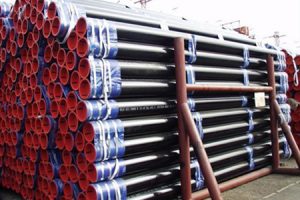Oil casing is a kind of steel pipe used to support the well wall of oil and gas Wells in the fixed hole. This kind of large caliber pipe can fix the oil and gas well wall or hole to ensure the normal operation of the drilling process and the completion of the whole well. Several layers of casing are used depending on the depth and geology of each well. After the casing run, cement is used to prevent the borehole from separating rock strata and collapsing, and to ensure the circulation of drilling mud to facilitate mining.
 Limited by the harsh geological conditions, the downhole stress conditions act on the pipe body comprehensively, which puts forward higher requirements on the quality of the casing itself. Failure of the casing can lead to loss of production or even abandonment of the entire well. Unlike oil tubing and drill pipe, the casing can not be reused and belongs to disposable consumption material. As a result, casing consumption accounts for more than 70% of all well tubing. The casing can be divided into Conduit Casing, Surface casing, Technical casing and Oil-string casing.
Limited by the harsh geological conditions, the downhole stress conditions act on the pipe body comprehensively, which puts forward higher requirements on the quality of the casing itself. Failure of the casing can lead to loss of production or even abandonment of the entire well. Unlike oil tubing and drill pipe, the casing can not be reused and belongs to disposable consumption material. As a result, casing consumption accounts for more than 70% of all well tubing. The casing can be divided into Conduit Casing, Surface casing, Technical casing and Oil-string casing.
- Conduit Casing
The casing is mainly used for offshore and desert drilling to separate seawater from sand and ensure smooth drilling. The main specifications of the casing are 762mm(30in) x 25.4mm and 762mm(30in) x 19.06mm.
- Surface Casing
The surface casing is used for the first time to drill through the soft layer of the surface into the bedrock. It is used to seal this part of the formation without collapse. Surface casing specifications: 508mm(20in.), 406.4mm(16in.), 339.73mm(13-3/8in.), 273.05mm(10-3/4in.), 244.48mm(9-5/9in.), etc. The depth of pipe running depends on the depth of soft formation and is generally 80 to 1500m. The external pressure and internal pressure are not large, generally using Grade K55 casing or N80 steel grade.
- Technical casing
The technical casing is used in the drilling process of complex formations. When the complex parts such as a collapsed layer, oil layer, gas layer, water layer, leakage layer and salt paste layer are encountered, a technical casing is needed to seal, otherwise, the drilling can not be carried out. Some Wells are deep and complex, with drilling depths of thousands of meters. This deep well requires several layers of technical casing, which requires higher mechanical properties and sealing performance. Generally, N80 and P110 steel grades are used more, in addition to K55, some deep Wells also use Q125 pipe or higher non-API steel grades such as V150. Technical casing specifications: 339.73mm(13-3/8in.), 273.05mm(10-3/4in.), 244.48mm(9-5/8in.), 219.08mm(8-5/8in.), 193.68mm(7-5/8 in.), 177.8mm(7in.), etc.
- Oil-string casing
When drilling into the target layer (oil-bearing, gas-bearing layer), it is necessary to use an oil layer casing to seal the oil and gas layer and the upper exposed formation. The casing of an oil reservoir has the deepest well-running depth among all kinds of casing, and its mechanical properties and sealing performance requirements are also the highest. The steel grade is K55, N80, P110, Q125, V150, etc. The main casing specifications are: 177.8mm(7in), 168.28mm(6-5/8in), 139.7mm(5-1/2in), 127mm(5in), 114.3mm(4-1/2in), etc. Casing sizes range from 114.3 mm to 508 mm.
Steel casing pipes can vary in size and strength, so it is best to refer to the project specifications or local municipality specifications regarding exactly what type of steel casing pipe is to be used. In addition, according to THE API 5CT standard, the grades of steel can be H-40, J-55, K-55, C-75, L-80, N-80, C-90, C-95, P-110, Q-125. (The number x 1000 is the minimum yield strength psi of the casing). The steel grade is also different for different well conditions and depths. The casing is also required to have corrosion resistance in a corrosive environment, and the casing is also required to have collapse resistance in complex geological conditions. The most important of these are the rated collapse pressure and the electrical resistance of the piping. Both of these are important for a safe and reliable drilling operation.
API 5CT standard coupling plays an important feature in connecting casing and tubing line pipes. API5CT oil casing can be connected by STC, LTC, BTC, VAM and so on. Special threads are used in Wells where traditional API threads are not suitable for poor sealing and tensile strength, especially in Wells containing hydrogen sulfide, carbon dioxide, and chloride ions. Special threads are also used for higher steel grade tubing, such as Q125 and above.






